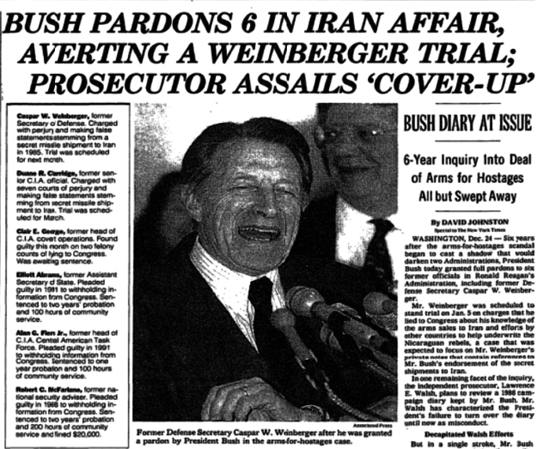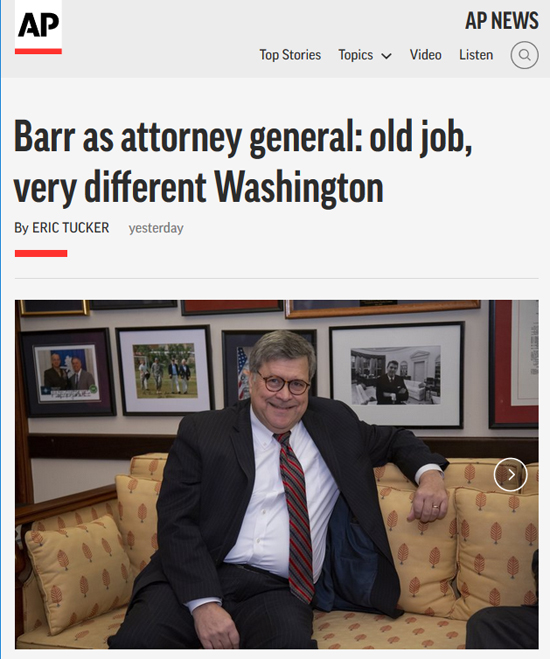
Lame duck President George Bush Sr. gave a Christmas present to Iran/Contra co-conspirators like Caspar Weinberger–and to himself (New York Times, 12/25/92).
A president facing a major scandal, just as the highest-profile trial is about to begin, pardons the indicted or convicted officials around him to effectively stop the investigation that’s closing in on his own illegal conduct.
Trump soon? We’ll see. But this actually describes what President George H.W. Bush did in 1992.
The Iran/Contra scandal revealed, among other things, that the Reagan/Bush White House had secretly sold missiles to Iran in exchange for hostages held in Lebanon, using the proceeds to fund right-wing forces fighting the leftist Nicaraguan government in violation of US law.
On Christmas Eve 1992, just as the indicted former Defense Secretary Caspar Weinberger was about to face trial, Bush pardoned him and five others, including former Assistant Secretary of State Elliott Abrams and and former National Security Advisor Robert McFarlane. The New York Times (12/25/92) reported this as “Bush Pardons 6 in Iran Affair, Averting a Weinberger Trial; Prosecutor Assails ‘Cover-Up.’”
The attorney general for Bush who approved the pardons, William Barr, is now being nominated for the same position by Trump. Is this background relevant? Though current news columns are rife with speculation that Trump might likewise protect himself by pardoning his indicted or convicted associates, the dominant US news wire service doesn’t seem to think so.

AP (1/14/19) describes Attorney General-nominee William Barr as “principled, smart and strong-willed”–not to mention a good person to have as your friend if you’re a Justice Department reporter.
In “Barr as Attorney General: Old Job, Very Different Washington” (1/14/19), Associated Press reporter Eric Tucker made no mention whatsoever of the Iran/Contra pardons. Rather than seriously examine the trajectory of presidential power and accountability, Tucker framed the story, as the headline indicates, as a stark contrast between the gentlemanly Bush and the “twice-divorced” Trump:
Serving Trump, who faces intensifying investigations from the department Barr would lead, is unlikely to compare with his tenure under President George H.W. Bush.
The false implication is that Bush did not himself face intensifying investigations from Lawrence Walsh, who operated out of the Justice Department’s Office of Special Counsel. The misleading comparison is compounded by Tucker describing Trump as “breaking with the practice of shielding law enforcement from political influence” and ousting Attorney General Jeff Sessions for “not protecting him in the Russia investigation” – as if Barr didn’t have direct experience in the first Bush administration with imposing political influence on law enforcement to protect a president from investigation.
Instead, Tucker cites Barr’s supporters calling him “driven by his commitment to the department” and “very much a law-and-order guy.” (The praise for the new head of the department Tucker regularly covers marks his article as a “beat-sweetener,” a long and unfortunate tradition of journalists’ making their jobs easier by sucking up to sources.)
This deceptive piece was apparently picked up by literally thousands of media outlets. A search of “unlikely to compare with his tenure under President George H.W. Bush” produces over 2,400 results.
As Consortium News founder Robert Parry, who broke much of the Iran-Contra story for AP, would later write in a review of Walsh’s book Firewall: Inside the Iran/Contra Cover-up:
The Republican independent counsel [Lawrence Walsh] infuriated the GOP when he submitted a second indictment of Weinberger on the Friday before the 1992 elections. The indictment contained documents revealing that President Bush had been lying for years with his claim that he was “out of the loop” on the Iran/Contra decisions. The ensuing furor dominated the last several days of the campaign and sealed Bush’s defeat at the hands of Bill Clinton.
Walsh had discovered, too, that Bush had withheld his own notes about the Iran/Contra Affair, a discovery that elevated the President to a possible criminal subject of the investigation. But Bush had one more weapon in his arsenal. On Christmas Eve 1992, Bush destroyed the Iran/Contra probe once and for all by pardoning Weinberger and five other convicted or indicted defendants.
Parry, who died a year ago, left AP after many of his stories on Iran/Contra were squashed (Consortium News, 1/28/18).
After I criticized AP on Twitter for the omission, a later piece by Tucker, co-written with Michael Balsamo, noted perfunctorily in the 16th graph: “As attorney general in 1992, he endorsed Bush’s pardons of Reagan administration officials in the Iran/Contra scandal.” (A search on “as attorney general in 1992, he endorsed Bush’s pardons of Reagan administration officials in the Iran/Contra scandal” produced a mere 202 results.)
While much of the media obsesses over every bit of “Russiagate,” some breathlessly anticipating the next revelation will surely bring down the Trump presidency, it’s remarkable how little interest there is in the trajectory of presidential power.
Rather, much of the establishment media has gone to great lengths to rehabilitate officials from both Bush administrations, including the elder Bush himself when he died last month. (One exception to the generally hagiographic coverage of his death was Arun Gupta’s “Let’s Talk About George H.W. Bush’s Role in the Iran/Contra Scandal” – in The Intercept, 12/7/18.) Indeed, Trump naming Barr just after George H.W. Bush’s funeral could be seen as a jiu-jitsu move: How could anyone object to his nominating the AG of the just-sainted Poppy Bush? It’s as though Trump were saying, “If you all like him so much, I’ll have what he had.” See the Institute for Public Accuracy news release, “Barr as AG? Bush and Trump Dovetail.”
AP‘s actions also fit into the institution-protecting mode of what Parry derided as the “conventional wisdom” – which in its current formulation depicts Trump’s authoritarian tendencies as aberrations from the norms of US politics, rather than a continuation of the worst tendencies of his predecessors.
Messages to Associated Press can be sent to info@ap.org (or via Twitter @AP). Please remember that respectful communication is the most effective.
Sam Husseini is senior analyst at the Institute for Public Accuracy. He’s also set up VotePact.org – which helps break out of the two party bind. His latest personal writings are at http://husseini.posthaven.com/ and tweets at http://twitter.com/samhusseini. This originally appeared at Fairness & Accuracy in Reporting.


